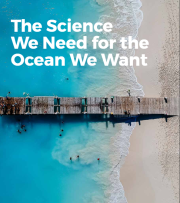17.01.2013 – Natural Sciences Sector
Biodiversity from terrestrial, marine, coastal, and inland water ecosystems form the basis for the crucial services they provide, contributing to human well-being and to the reduction of poverty. More than 1.3 billion people depend on biodiversity and on basic ecosystems goods and services for their livelihoods. However, biodiversity and ecosystem services are declining at an unprecedented rate and the world failed to reach the Millennium Development Goal (MDG) target of a significant reduction in the rate of biodiversity loss by 2010. The first session of the Plenary of the Intergovernmental Platform on Biodiversity and Ecosystem Services (IPBES-1) that will be held in Bonn, Germany from 21 to 26 January 2013, marks a big step towards enabling the international community to address these issues.
There was no on-going global mechanism recognized by both the scientific and policy communities to gather, synthesize and analyse information on biodiversity for decision making until IPBES was established in April 2012. Its members are committed to building IPBES as the leading intergovernmental body for assessing the state of the planet’s biodiversity, its ecosystems and the essential services they provide to society. The Platform is an independent intergovernmental body open to all member countries of the United Nations.
UNESCO, the United Nations Environment Programme (UNEP), the Food and Agriculture Organization of the United Nations (FAO) and the United Nations Development Programme (UNDP) are acting as the interim Secretariat of IPBES until such time a permanent secretariat is set up in Bonn.
IPBES-1 will be the first meeting of Members of the Platform’s plenary, with observers. The Bonn meeting will aim to agree on the remaining rules of procedures for the platform, elect Bureau and Multidisciplinary Expert Panel members, and agree on the next steps by which the IPBES work programme can become operational as soon as possible.
Decision makers need scientifically credible and independent information that takes into account the complex relationships between biodiversity, ecosystem services, and people in order to adopt and implement adequate policies. They also need effective methods to interpret this scientific information in order to make informed decisions. The scientific community needs to better understand the needs of decision makers in order to provide them with the relevant information. In essence, the dialogue between the scientific community, governments, and other stakeholders on biodiversity and ecosystem services needs to be strengthened.
IPBES was established to this end. It is unique in that it will aim to strengthen capacity for the effective use of science in decision-making at all levels. IPBES will also aim to address the needs of Multilateral Environmental Agreements that are related to biodiversity and ecosystem services, and build on existing processes ensuring synergy and complementarities in each other’s work.
An informal expert workshop on the main issues relating to the development of a conceptual framework for the Platform was held at UNESCO Headquarters in October 2012 in preparation for this first meeting; UNESCO is organizing a side event to present and discuss the workshop’s conclusions.
Another side event on recognizing indigenous and local knowledge and building synergies with science (Item 5 of the agenda) will also be organized by UNESCO. This reflects UNESCO’s lead role in the development of draft guidelines on the recognition by IPBES of relevant indigenous and local knowledge in the context of the Platform’s work.




